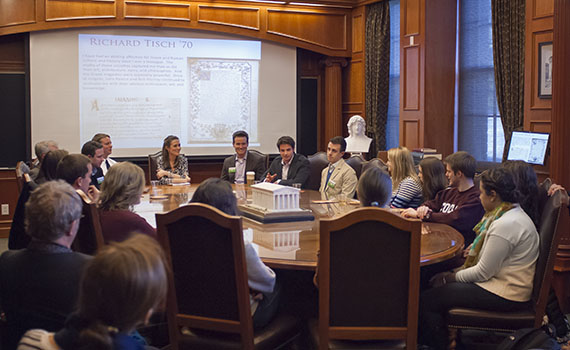
Seven Colgate graduates discuss law as a profession, its role in their own professional lives, and how a classics major helped them in law school. (Photo by Gabriela Bezerra ’13)
Students considering a career in law might not immediately make the connection to ancient philosophers Socrates and Plato, but they should.
Alumni from the Department of the Classics returned to campus March 26 to talk about how their majors, ranging from Latin to Greek to classics studies, have propelled them to success in both law school and in their legal careers.
“It sets you apart from almost everyone in law school,” said Carl Ruggiero ’10, who majored in Latin and is now a first-year student at Stanford Law. “Everyone knows it’s difficult, interesting, and intrinsically connected to law.”
For Robert Coomber ’01, graduating with a degree in classical studies gave him an analytical skill set he continues to draw upon in his career, first as a middle school Latin teacher, and now as a member of the Congressional Office of Compliance in Washington, D.C., where he is a staff attorney.
“You kind of go in with this instant credibility,” Coomber said. “This skill set is unique. Breaking down, line by line, what legal precedent says and applying it to a current argument …. It really provides you with a nice basis to go forward.”
Richard Tisch ’70 went on to a successful legal career at the U.S. Environmental Protection Agency after graduating from Colgate and law school. Tisch later joined a Fortune 300 company where he worked as senior group counsel, and eventually taught law at Pace University Law School.
“You need to sweat the details, and you have to memorize vocabulary, which I remember doing 40-years ago in this building,” Tisch said of Lawrence Hall.
The alumni advice was important to panel attendee Ayisha McHugh ’16, of Brooklyn N.Y., who is considering a career in law, but remains undecided.
“I do think I have a love for it, and I’m drawn to it,” McHugh said.
Additional panel members included current Cornell Law School student Jordan Garman ’12, New York Law School student Michael Fingerhut ’10, A senior legal editor at LexisNexis Derrick Wilborn ’91, and Bill Baaki ’98, a member of Phillips Lytle in Buffalo, one of Western New York’s largest legal firms.
Professor Rebecca Ammerman, who taught most of the panel members, said she found the varied experiences and perspectives offered to be fascinating, and a testament to the classroom learning offered at Colgate.
“It was heartening to hear each panelist’s affirmation that learning to read closely and analytically — evaluating the shades of meaning of individual words and phrases in an ancient Greek or Latin text — was an invaluable lesson for his or her study of the law,” Ammerman said.